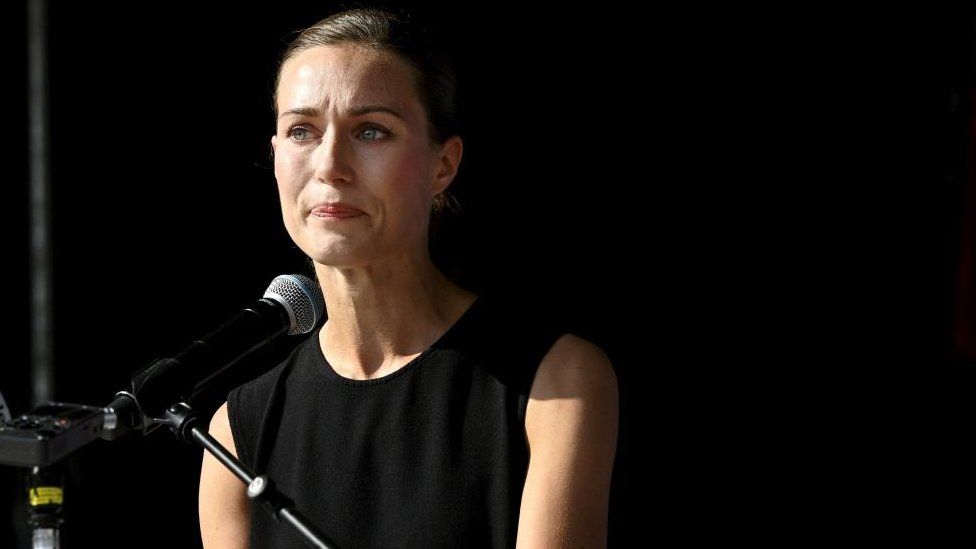ARTICLE AD BOX
By Elsa Maishman
BBC News
 Image source, Reuters
Image source, Reuters
Ms Marin gave a tearful defence of her right to a private life at a party meeting on Wednesday
On a summer night in Helsinki a few weeks ago, Sanna Marin went partying with her friends. The 36-year-old drank alcohol, danced and sang along to music in a private venue.
Someone pulled out a phone, and the revellers posed for the camera, dancing, laughing and hugging each other.
A perfectly normal night out for any ordinary woman in her 30s.
But as the prime minister of Finland, Ms Marin is not an ordinary woman.
Footage of the party was leaked on social media, leading to a national - then international - outcry, and ending in the prime minister being forced by political pressure to take a drugs test, which came back negative.
When a photo was later published of two influencers kissing partially topless at her official residence Kesaranta at a different event, she apologised and admitted it was "inappropriate".
Mikael Jungner, former secretary of the Social Democratic Party (SDP) led by Ms Marin, said the recent video and photo leaks have made her seem "ridiculous" and there is now little chance for her to survive as prime minister in next year's election.
"It is not a place to be as a politician when people are laughing at you... it was getting really dangerous for her career," he said.
The problem is not the partying, he insists, but "partying with the wrong people".
If she had been seen with childhood friends, or members of her political party, Finns may have embraced this as Ms Marin behaving like one of them. But people find it harder to relate to partying with celebrities. Leaked videos showed Ms Marin dancing with a pop star, influencers and media presenters.
Johanna Vuorelma, a political scientist at Helsinki University, also emphasised the formality of politics in Finland.
The topless picture at Kesaranta would be unacceptable to many Finns, she said: "For many it is a sacred place of democracy and it should be respected."
Many have said the controversy around Sanna Marin reeks of sexism, and pointed out that she is hardly the first leader to be accused of inappropriate parties. Women across Finland and the world took to social media to share videos of themselves dancing, saying her only offence was daring to have fun as a young and attractive woman.
As she pointed out this week: "During these dark times, I need some joy, light and fun as well."
Some have also said she would have been excused if her activities had been more elitist or traditionally befitting world leaders. Ms Marin has embraced her image as a "normal person" - the first in her family to go to university, she worked in menial jobs while studying.
But Mikael Jungner argues the backlash would have been "a lot worse" for a young man in the same situation. "Dancing provocatively, having parties… it would have been a catastrophe," he said.
Image source, Twitter
Image caption,Ms Marin said she was only "the same as many people my age"
Johanna Vuorelma agrees Ms Marin's actions would have provoked scandal even if she were a man, but says the tone would have been very different.
The prime minister has a four-year-old daughter with her partner Markus Raikkonen, and there have been comments that her behaviour was inappropriate as a mother. It is difficult to imagine such remarks directed at a father, says the political scientist.
The videos have also been sexualised in a way they would not have been of a man, she argues.
There was a scandal in 2018 when the former chair of the Finnish Green Party, Touko Aalto, was pictured dancing shirtless in a gay club. He resigned two months later, citing exhaustion and depression, but the situation did not have the same sexual undertones.
Anu Koivunen, a professor of gender studies at Turku University, agrees that a man in Sanna Marin's position would also have faced a scandal, but the tone has been different because of her gender.
This isn't the first time the prime minister has been in trouble over partying. She apologised in December 2021 after going clubbing following close contact with a Covid case. She had left her work phone behind, and missed an instruction to isolate.
But this image of a partying prime minister is recent. Sanna Marin was relatively unknown to the public when she took over from former prime minister Antti Rinne in December 2019. During the pandemic she developed a reputation as a calm, firm leader.
"She is known for hard policy, strong leadership and tough negotiations," said Prof Koivunen, adding that against this backdrop the partying footage seemed "other-worldly".
Johanna Vuorelma believes the international debate over her actions is very different to that in Finland. Domestically the issue is about politics, legality, and what is appropriate for a prime minister, while internationally it has become more of a moral issue, fuelled by the fact that Ms Marin is one of very few young female national leaders.
She may not yet be past this scandal. Prof Koivunen thinks there is a risk more pictures or videos may emerge as the Finnish budget is renegotiated next week.
One criticism from political opponents may be around her supposed distraction from other issues: the picture of topless influencers kissing was taken at a party after the Ruisrock music festival in July.
At the time the Finnish government - but not Ms Marin personally - was in tense negotiations with Germany about bailing out gas company Uniper, which is suffering from soaring energy prices related to Russia's invasion of Ukraine. The bailout could cost Finnish taxpayers billions of euros.
The Finnish leader has championed her country's bid to abandon its long-standing neutrality and join Nato. Finland shares an 823-mile (1,324 km) land border with Russia.
The partying controversy could cost Ms Marin's party the next election and spell the end of her leadership of the SDP, says Mr Jungner. But she was already trailing in the polls and that would likely have happened anyway, he adds.
But in the long term, he thinks it might actually do her good. She will gain a lot of support, especially from young, female voters, and the affair could generate support for the somewhat old-fashioned SDP ahead of next year's election.
Mr Jungner thinks she may well run for president in 2024 and win. Finland's head of state has notable powers, including over foreign policy and national security.
Finns are fond of the narrative of someone returning from failure, he explains: it shows they know how to overcome it.
What's more, she has built a very strong base of supporters who see her as a rock star, he says: "I've never seen anything like her.
"Most definitely her career is not over."
WATCH: Dancing women show support for Finland's PM

 2 years ago
24
2 years ago
24








 English (US) ·
English (US) ·